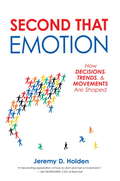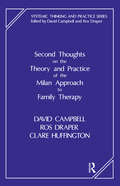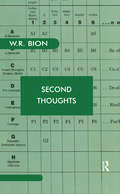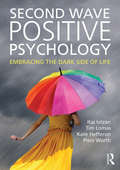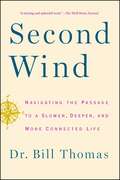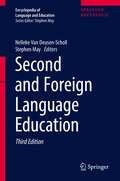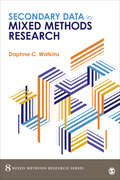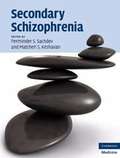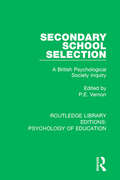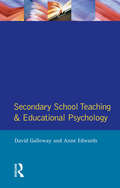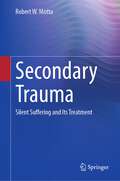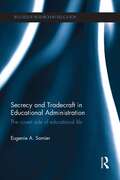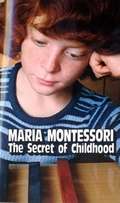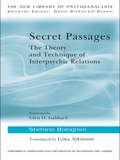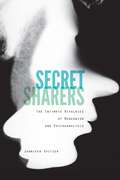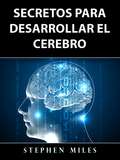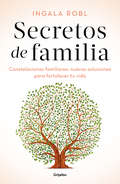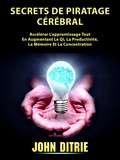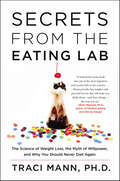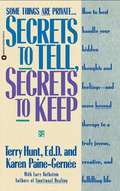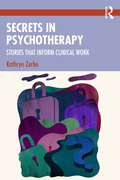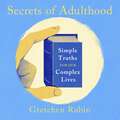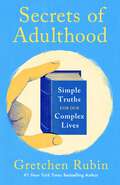- Table View
- List View
Second Language Speech
by Colantoni, Laura and Steele, Jeffrey and Escudero, Paola Laura Colantoni Jeffrey Steele Paola EscuderoSecond language acquisition has rapidly grown as a field over the past decade, as our knowledge of the ways in which children and adults learn and use a second language has become crucial for effective language teaching. In addition to this important 'applied' function, research into second language acquisition has also informed the fields of linguistics and psychology in general, as it has shed light on the differences between native and non-native models of human language and cognition. The focus of this accessible new book is second language speech - that is, how speakers perceive, process, understand and pronounce the sounds of a second language. Each chapter includes review questions, and most chapters include 'tutorial' and 'lab' sections with practical exercises based on the University of Toronto Romance Phonetics Database (available online for free). The book also has a companion website, containing illustrated answers to the exercises, scripts for running acoustic analyses and useful weblinks.
Second That Emotion
by Jeremy D. HoldenFor businesspeople who want to see their company or brand break through, this book is both essential and entertaining reading. For the rest of us, the author provides a window into our decision-making processes, and how emotion-based illogical leaps drive our support for movements, whether they are political, commercial, or related to popular culture. Why do more than 30 percent of Americans believe President Obama is a Muslim? Why do most fans who supported Dove®'s "campaign for real beauty" feel comfortable ignoring the fact that the brand's parent company, Unilever, was also behind the Axe® campaign, a brand that has blatantly stereotyped women? Why is Yoko Ono still held responsible for the breakup of the Beatles? These and other random, yet related, questions are explained in here. An advertising and communications expert traces the fascinating process whereby a passion for an idea, a politician, a celebrity, or a brand gives rise to a set of illogical beliefs that becomes the basis for a powerful movement. Conventional wisdom has it that spin doctors and Madison Avenue are responsible for manipulating our thoughts, causing us to endorse ideas or buy products that we would otherwise reject outright. Holden shows that while advertising and propaganda can provide a spark and social media provides the kindling, individuals create consumer, political, and cultural trends based, more often than not, on thinking that they know logically to be flawed.
Second Thoughts on the Theory and Practice of the Milan Approach to Family Therapy (The Systemic Thinking and Practice Series)
by David Campbell Ros Draper Clare HuffingtonSecond Thoughts on the Theory and Practice of the Milan Approach to Family Therapy is a full discussion of the way the original techniques of the Milan Approach have been affected by current thinking in the family therapy field. Hypothesizing, neutrality and circularity, for example, are all redefined in response to the challenge of new clinical problems, such as child abuse, and new thinking from areas such as linguistics and feminine.
Second Thoughts: Selected Papers on Psychoanalysis
by Wilfred R. BionSecond Thoughts is a collection of papers on Schizophrenia, Linking and Thinking, and is a commentary upon them in the light of later work. Originally composed between 1950 and 1962, it derives its title from the lengthy critical commentary which Bion attached to these case histories in the year of publication, 1967, and represents the evolutionary change of position marked in his three previous books and brought to further refinement in the present work.
Second Wave Positive Psychology: Embracing the Dark Side of Life
by Itai Ivtzan Kate Hefferon Tim Lomas Piers WorthPositive psychology is currently equated with theory and research on the positive aspects of life. The reality could not be further from the truth. Positive psychology investigates and researches some of the most difficult and painful experiences. Second Wave Positive Psychology: Embracing the Dark Side of Life is an innovative and groundbreaking textbook that explores a variety of topics we consider to be part of the ‘dark’ side of life while emphasising their role in our positive functioning and transformation as human beings. This more nuanced approach to the notions of ‘positive’ and ‘negative’ can be described as the ‘second wave' of Positive Psychology. Positive Psychology is one of the fastest growing and least understood branches of psychology. Exploring topics at the heart of Positive Psychology, such as meaning, resilience, human development, mortality, change, suffering, and spirituality, this book engages with so-called ‘negative’ matters from a Positive Psychology angle, showing how the path of personal development can involve experiences which, while challenging, can lead to growth, insight, healing and transformation. ? Containing useful resources, case studies, practical exercises and chapter summaries, Second Wave Positive Psychology is an essential guide for undergraduate and postgraduate students studying positive psychology, as well as clinicians wanting to know more about the subject. It will also be relevant to the layperson who is interested in positive psychology.
Second Wind
by Dr Bill ThomasHow do you know that you are outgrowing adulthood? When you begin to feel that the life you have been living is out of balance; when the need to perform, to hurry, and to acquire is no longer compelling. It's like the moment when your favorite tennis shoes start to give you blisters. The way you've been living your adult life doesn't fulfill you anymore. Dr. Bill Thomas, one of the most innovative thinkers in medicine, explains that a new life phase is beginning to emerge within our society. When the Baby Boom generation came of age in the 1960s and 1970s, they jump-started a cultural revolution that shaped today's society. Now, many feel they are living a life of frenzied disharmony. This out-of-balance feeling is a signal that you are ready for your second coming of age, your life beyond adulthood. Second Wind illuminates how to recognize and navigate the most challenging and fulfilling developmental stage of life. Life can and should be reimagined. New ways of living and working are waiting to be discovered on the far side of adulthood. Dr. Thomas treats the Baby Boom generation as he would one of his patients, sympathetically exploring its history before recommending a path toward a life rich with developmental opportunities. Predicting that Boomers will choose the path of the Denialist, the Realist, or the Enthusiast, he discusses the behaviors and attitudes that will provide new and more nourishing fuel for the rest of life's journey: hope and a renewed sense of all that is possible.
Second and Foreign Language Education
by Stephen May Nelleke Van Deusen-SchollIn this third, fully revised edition, the 10 volume Encyclopedia of Language and Education offers the newest developments, including an entirely new volume of research and scholarly content, essential to the field of language teaching and learning in the age of globalization. In the selection of topics and contributors, the Encyclopedia reflects the depth of disciplinary knowledge, breadth of interdisciplinary perspective, and diversity of socio-geographic experience in the language and education field. Throughout, there is an inclusion of contributions from non-English speaking and non-western parts of the world, providing truly global coverage. Furthermore, the authors have sought to integrate these voices fully into the whole, rather than as special cases or international perspectives in separate sections. The Encyclopedia is a necessary reference set for every university and college library in the world that serves a faculty or school of education, as well as being highly relevant to the fields of applied and socio-linguistics. The publication of this work charts the further deepening and broadening of the field of language and education since the publication of the first edition of the Encyclopedia in 1997 and the second edition in 2008.
Secondary Data in Mixed Methods Research (Mixed Methods Research Series)
by Daphne C. WatkinsSecondary Data in Mixed Methods Research by Daphne C. Watkins, the latest contribution to the Mixed Methods Research Series, offers unique and necessary instruction in this growing topic. With the increasing amount of secondary data available through journals and repositories, researchers have a trove of sources for new investigations at their fingertips, but few books to guide them. This brief text provides readers with a step-by-step procedure for incorporating secondary data into various mixed methods research designs, as well as identifying key characteristics of existing datasets that make them good candidates for mixed methods projects and giving ideas for new uses of secondary data. Introductory chapters help the reader understand the “what” and “why” of secondary data. Subsequent chapters address the use of secondary data in convergent, exploratory sequential, explanatory sequential, and other complex research designs. The final chapters delve into writing and reporting on projects before, during, and after the project. Quotes throughout the chapter help readers remember key bits of knowledge, while learning objectives and summaries in each chapter structure the reading experience. Application questions at the end of each chapter help readers recall information and apply it to their own research projects. By emphasizing how to use existing qualitative and quantitative datasets in mixed methods research, Secondary Data in Mixed Methods Research will help readers answer new and ongoing questions in social science research.
Secondary Data in Mixed Methods Research (Mixed Methods Research Series)
by Daphne C. WatkinsSecondary Data in Mixed Methods Research by Daphne C. Watkins, the latest contribution to the Mixed Methods Research Series, offers unique and necessary instruction in this growing topic. With the increasing amount of secondary data available through journals and repositories, researchers have a trove of sources for new investigations at their fingertips, but few books to guide them. This brief text provides readers with a step-by-step procedure for incorporating secondary data into various mixed methods research designs, as well as identifying key characteristics of existing datasets that make them good candidates for mixed methods projects and giving ideas for new uses of secondary data. Introductory chapters help the reader understand the “what” and “why” of secondary data. Subsequent chapters address the use of secondary data in convergent, exploratory sequential, explanatory sequential, and other complex research designs. The final chapters delve into writing and reporting on projects before, during, and after the project. Quotes throughout the chapter help readers remember key bits of knowledge, while learning objectives and summaries in each chapter structure the reading experience. Application questions at the end of each chapter help readers recall information and apply it to their own research projects. By emphasizing how to use existing qualitative and quantitative datasets in mixed methods research, Secondary Data in Mixed Methods Research will help readers answer new and ongoing questions in social science research.
Secondary Schizophrenia
by Perminder S. Sachdev Matcheri S. KeshavanSchizophrenia may not be a single disease, but the result of a diverse set of related conditions. Modern neuroscience is beginning to reveal some of the genetic and environmental underpinnings of schizophrenia; however, an approach less well travelled is to examine the medical disorders that produce symptoms resembling schizophrenia. This book is the first major attempt to bring together the diseases that produce what has been termed 'secondary schizophrenia'. International experts from diverse backgrounds ask the questions: does this medical disorder, or drug, or condition cause psychosis? If yes, does it resemble schizophrenia? What mechanisms form the basis of this relationship? What implications does this understanding have for aetiology and treatment? The answers are a feast for clinicians and researchers of psychosis and schizophrenia. They mark the next step in trying to meet the most important challenge to modern neuroscience - understanding and conquering this most mysterious of human diseases.
Secondary School Selection: A British Psychological Society Inquiry (Routledge Library Editions: Psychology of Education)
by P. E. VernonSelection for secondary education at 11-plus still arouses widespread controversy; and the psychological techniques which are employed, such as intelligence and attainments tests, are often criticised. Originally published in 1957, under the auspices of the British Psychological Society, a group of psychologists, experienced in this field, tried to present a balanced survey of the situation at the time. They show that the real problems of secondary schooling cannot be solved by simple administrative changes; they arise from historical causes, from the class structure of English society and the educational and vocational ambitions of parents. Psychology has studied the development and differentiation of children’s abilities and interests with age, and thus throws light on the need for, and the consequences of, streaming children in different classes or schools, and the value of alternative systems such as the comprehensive school. Selection at 11-plus, it is admitted, does have harmful effects on teaching in the junior school and produces much emotional strain, though these effects are often exaggerated. It was, in fact, accurate for some ninety per cent of children; yet the implications of its inevitable inaccuracy for some pupils cannot be ignored. The functions, and the value, of intelligence and attainments tests and the essay are examined, and full consideration given to the use of teachers’ estimates of suitability and other techniques. The Report is addressed primarily to teachers, educational administrator, and psychologists – that is people with some background knowledge of the problems involved; but it should also be intelligible and helpful to the educated layman, since the more technical details are confined to Appendices.
Secondary School Teaching and Educational Psychology (Effective Teacher, The)
by Anne Edwards David GallowayA companion volume to Primary School Teaching and Educational Psychology, this book concerns itself with the day-to-day business of teaching in a secondary school. Throughout the book four themes reoccur: that teachers can best understand the development of children by observing their learning and their relationships within school; that assessment and evaluation are integral to effective teaching; that effective teaching and learning depend on both teacher and child being able to monitor own progress and to find solutions to problems that occur; and finally that there must be explicit recognition of the common-ground between educational psychology and other disciplines such as sociology, philosophy and the history of education.
Secondary Trauma: Silent Suffering and Its Treatment
by Robert W. MottaThis book focuses on secondary trauma as distinct from other forms of psychological trauma and PTSD. While PTSD has garnered considerable attention in the literature, secondary trauma afflicts a far greater number of people. Secondary trauma refers to the spread of negative emotional and cognitive states from those who are traumatized to those who have close contact with these individuals. While PTSD and other forms of primary trauma can negatively alter one’s self-perception and result in a fearful distrust of one’s environment, secondary trauma taxes and drains one emotionally but often does not cause a weary distrust of the environment and negative self-view. The book delineates how, when, and where secondary trauma occurs and provides the latest information on treatments. it is noted that unlike primary trauma and PTSD which respond to traditional treatments such as cognitive-behavioral therapy and exposure therapy, secondary traumatization is best addressed with interventions such as targeted social support, various exercise interventions, mindfulness, yoga, animal assisted therapy, and immersion in natural environments. Secondary trauma is a common and commonly ignored stressor whose impact is wide ranging. This volume accessibly brings this problem to the fore and is a resource for all of those who deal with "silent sufferers" and paves the way for further, necessary study.
Secrecy and Tradecraft in Educational Administration: The covert side of educational life (Routledge Research in Education)
by Eugenie A. SamierDuring the last couple of decades, there has been an expansion in a number of related and overlapping fields producing evidence of covert activities: toxic cultures, destructive leadership styles, micropolitics, ethical problems in organisations and administration, abusive power and authority, and many other topics of dysfunctional management and leadership studies that frequently make reference to secretive and deceptive behaviour. In this book, Eugenie A. Samier draws on a range of disciplines including education, psychology, administration and management studies and organizational theory to provide a comprehensive examination of the ways in which organisational leaders and administrators carry out their roles in a secretive or deceptive manner. Samier presents a theory of covert administration that can be used to: provide an analysis and interpretation of secretive and deceptive activity inform decision-making both theoretically and practically offer a means of diagnosing errant management using secretive and deceptive practices provide a general set of guidelines for determining when clandestine activities may be legitimate and moral. Alongside a detailed presentation of the theory of covert administration, the book explores covert administration in practice, factors leading to it, and the results of attempts to combat its many forms. It will be key reading for researchers and postgraduates with an interest in the field, as well as administrators and policy makers.
Secret Of Childhood
by María MontessoriMaria Montessori describes the child with warmth and the exactness of a scientist. She also discusses the array of materials and techniques needed to release his learning potential.
Secret Passages: The Theory and Technique of Interpsychic Relations (The New Library of Psychoanalysis)
by Stefano BologniniSecret Passages provides a theoretical and clinical exploration of the field of psychoanalysis. It looks at the pivotal relationship between analyst and client and its importance to the psychoanalytic process. Offering a uniquely global perspective, Bolognini considers the different trends in contemporary psychoanalysis, charting a course between the innovative and traditional. Divided into three parts, areas of discussion include: plurality and complexity in the internal world the complex nature of psychoanalytic empathy from the transpsychic to the interpsychic. Drawing on vivid clinical examples throughout, Secret Passages will be of great interest to all psychoanalysts, in particular those with an interest in gaining a more global theoretical perspective.
Secret Sharers: The Intimate Rivalries of Modernism and Psychoanalysis
by Jennifer SpitzerSecret Sharers traces a genealogy of secret sharing between literary modernism and psychoanalysis, focusing on the productive entanglements and intense competitive rivalries that helped shape Anglo-American modernism as a field. As Jennifer Spitzer reveals, such rivalries played out in explicit criticism, inventive misreadings, and revisions of Freudian forms—from D. H. Lawrence’s re-descriptions of the unconscious to Vladimir Nabokov’s parodies of the psychoanalytic case study. While some modernists engaged directly with Freud and Freudian psychoanalysis with unmistakable rivalry and critique, others wrestled in more complex ways with Freud’s legacy. The key protagonists of this study—D. H. Lawrence, Virginia Woolf, W. H. Auden, and Vladimir Nabokov—are noteworthy for the way they engaged with, popularized, and revised the terms of Freudian psychoanalysis, while also struggling with it as an encroaching discourse. Modernists read psychoanalysis, misread psychoanalysis, and sometimes refused to read it altogether, while expressing anxiety about being read by psychoanalysis—subjecting themselves and their art to psychoanalytic interpretations.As analysts, such as Freud, Ernest Jones, and Alfred Kuttner, turned to literature and art to illustrate psychoanalytic theories, modernists sought to counter such reductive narratives by envisioning competing formulations of the relationship between literature and psychic life. Modernists often expressed ambivalence about the probing, symptomatic style of psychoanalytic interpretation and responded with a re-doubling of arguments for aesthetic autonomy, formal self-consciousness, and amateurism. Secret Sharers reveals how modernists transformed the hermeneutic and diagnostic priorities of psychoanalysis into novel aesthetic strategies and distinctive modes of epistemological and critical engagement. In reassessing the historical and intellectual legacies of modernism, this book suggests that modernist responses to psychoanalytic criticism anticipate more recent critical debates about the value of “symptomatic” reading and the “hermeneutics of suspicion.”
Secretos Para Desarrollar el Cerebro
by Stephen MilesSecretos Para Desarrollar el Cerebro: Acelerar el Aprendizaje Mientras se Aumenta el Coeficiente Intelectual, la Productividad, La Memoria y la Concentración ¡Los secretos que utilizan los profesionales para optimizar sus cerebros! Con décadas de estrategias probadas, este libro digital te mostrar las maneras más rápidas y efectivas de mejorar tu memoria. Aprenderás como incrementar la cognición y a aumentar el coeficiente intelectual en unas pocas horas. No solo eso, pero estarás más enfocado, lograras más, y tendrás más energía que antes. ¿Quieres saber cómo los mejores y más brillantes del mundo se desempeñan a niveles tan altos? Aun si eres de inteligencia promedio, puedes también aprender los secretos para alcanzar este tipo de desempeño. Esta guía te ensena técnicas probadas que mejoraran tu memoria. Incluye: - Un programa de entrenamiento rápido y eficiente - Aumenta la productividad - Aumenta la memoria - Aumenta la concentración - Aumenta la inteligencia en general + ¡Y MUCHO MÁS! Si quieres entrenar a tu cerebro de la mejor manera posible entonces este libro es para ti. Si quieres ser más saludable, curar tus enfermedades, o mejorar tu enfoque & tu bienestar, entonces esta guía es para ti. --> Desplázate a la parte superior de la página y haz clic en agregar al carrito de compra, para obtenlo al instante Descargo de Responsabilidad: Este autor y/o el dueño de los derechos de autor, no afirma, promete, o garantiza en relación la exactitud, exactitud o pertinencia de los contenidos de este libro, y expresamente renuncia a responsabilidad por errores u omisiones de los contenidos que comprende. Este producto es únicamente para uso de referencia. Por favor, consulte a un profesional antes de tomar acción sobre cualquiera de los contenidos encontrado dentro.
Secretos de familia
by Ingala RoblSiempre ha habido excluidos y siempre ha habido secretos en las familias. ¿Qué ocasionan estos actos y silencios? ¿Cómo se traducen en las relaciones personales? ¿Por qué a veces repetimos patrones y no entendemos de dónde vienen? ¿Cómo reordenar el sistema familiar para sanar? Las constelaciones familiares son un instrumento de diagnóstico altamente eficaz que proporciona una respuesta objetiva a este tipo de cuestionamientos. Mediante las constelaciones, lo que se consideraba "malo", como la enfermedad, la soledad, la tragedia o la muerte, cobra un nuevo significado y una fuerza potencial que restituye el sentido de la vida; asimismo, podemos desmitificar el dolor, reconocerlo como gran aliado, y respetar los errores y la historia de nuestros ancestros para hacer algo mejor. Por ello, en este libro actualizado, Ingala Robl (la especialista número uno en Constelaciones familiares en toda América Latina y discípula directa del creador de este método) nos presenta una extraordinaria herramienta para observar, reconocer, aceptar y honrar lo que nos ha tocado, soltar aquello que no nos corresponde y asumir con humildad que hay una fuerza superior, una gran alma que nos une a nuestros antepasados y nos guía para contemplar y vivir la vida, permitiendo que fluya hacia donde tiene que fluir: hacia un destino más allá de nuestra limitada comprensión individual.
Secrets De Piratage Cérébral: Accélérer l'apprentissage tout en augmentant le QI, la productivité, la mémoire et la concentration
by Stephen MilesLes secrets que les professionnels utilisent pour optimiser leur cerveau! Avec des décennies de stratégies testées, cet ebook vous montrera le moyen le plus rapide et le plus efficace de mettre à niveau votre mémoire. Vous allez apprendre comment augmenter la cognition et augmenter le QI en quelques heures seulement. Non seulement cela, mais vous serez plus concentrés, vous accomplirez plus et plus avec une énergie que vous n’avez jamais eu auparavant. Vous voulez savoir comment les meilleurs et les plus brillants du monde fonctionnent à des niveaux aussi élevés? Même si vous ayez qu'une intelligence moyenne, vous pouvez aussi apprendre les secrets pour atteindre ce type de performance. Ce guide vous enseigne des techniques éprouvées pour améliorer votre mémoire. Ce qui est inclu: Programme de formation efficace et rapide. Augmentation de la productivité. Augmenter la mémoire. Augmenter le focus. Augmenter l'intelligence globale. Et BEAUCOUP PLUS! Si vous voulez entraîner votre cerveau de la meilleure façon possible, ce livre est pour vous. Faites défiler vers le haut de la page et cliquez sur Ajouter au panier pour acheter instantanément Avertissement: Cet auteur et / ou le (s) titulaire (s) des droits ne font aucune réclamation, promesse ou garantie en ce qui concerne l'exactitude, l'exhaustivité ou l'adéquation du contenu de ce livre et décline expressément toute responsabilité quant aux erreurs et omissions dans le contenu qu'il contient. Ce produit est à usage de référence seulement. S'il vous plaît consulter un professionnel avant de prendre des mesures sur l'un des contenus trouvés dans ce livr genre du livre:PSYCHOLOGIE / Neuropsychologie Langue:Français
Secrets From the Eating Lab: The Science of Weight Loss, the Myth of Willpower, and Why You Should Never Diet Again
by Traci MannA provocative expose of the dieting industry from one of the nation’s leading researchers in self-control and the psychology of weight loss that offers proven strategies for sustainable weight loss.From her office in the University of Minnesota’s Health and Eating Lab, professor Traci Mann researches self-control and dieting. And what she has discovered is groundbreaking. Not only do diets not work; they often result in weight gain. Americans are losing the battle of the bulge because our bodies and brains are not hardwired to resist food—the very idea of it works against our biological imperative to survive.In Secrets From the Eating Lab, Mann challenges assumptions—including those that make up the very foundation of the weight loss industry—about how diets work and why they fail. The result of more than two decades of research, it offers cutting-edge science and exciting new insights into the American obesity epidemic and our relationship with eating and food.Secrets From the Eating Lab also gives readers the practical tools they need to actually lose weight and get healthy. Mann argues that the idea of willpower is a myth—we shouldn’t waste time and money trying to combat our natural tendencies. Instead, she offers 12 simple, effective strategies that take advantage of human nature instead of fighting it—from changing the size of your plates to socializing with people with healthy habits, removing “healthy” labels that send negative messages to redefining comfort food.
Secrets To Tell, Secrets To Keep
by Terry Hunt Karen Paine-Gernée Larry RothsteinThe pioneering therapists who wrote "Emotional Healing" present that book's long-awaited sequel. A challenge to today's popular "tell-all" psychotherapy programs, this important guide teaches readers how to discern which secrets to tell and which to keep for optimum emotional healing.
Secrets in Psychotherapy: Stories that Inform Clinical Work
by Kathryn ZerbeThis book brings together contemporary perspectives from psychodynamic treatment, advances in cognitive science, medicine, and neuroscience in a user-friendly format guiding practitioners from beginner to more advanced practitioner in working with secrets that emerge during psychotherapy.Despite their ubiquity in life and in clinical practice, secrets and secret-keeping receive limited attention in the training and skill set required for mental health clinicians. Drawing on personal experience and clinical expertise as well as film, memoir, and literature, Dr. Kathryn Zerbe shares how secrets come to light in both life and treatment, demonstrating the powerful hold that secrets can have on our lives. This book offers a fresh take on how we view our secrets, and how we can use them as a tool to sustain our most intimate and valued connections over the course of a lifetime. Using cutting-edge research as well as honed clinical expertise, the author suggests how one might go about managing the secrets of everyday living that we must keep as well as how we can identify which we can let go. Particular attention is paid to the mind/body relationship and somatic countertransference reactions. Each chapter suggests guidelines to promote wellness and resilience in the secret keeper, whether that be the psychotherapist or their patient.Written with compassion and in a user-friendly style, Secrets in Psychotherapy will benefit anyone who is navigating the thorny terrain of keeping a secret for themselves or someone they know. It is an essential read for psychotherapists, psychoanalysts, and practicing mental health professionals of all disciplines.
Secrets of Adulthood: Simple Truths for Our Complex Lives - the inspiring new book from the multi-million copy bestselling Queen of Self-Help
by Gretchen RubinThe #1 New York Times bestselling author of The Happiness Project and Better Than Before distills her key insights into simple truths for living with greater satisfaction, clarity and happiness.The right idea, invoked at the right time, can change your life. Drawing from her long studies of happiness, and also from the challenges she's faced herself, writer Gretchen Rubin has discovered the "Secrets of Adulthood" that can help us manage the complexities of life. To convey her conclusions, she turned to the aphorism - the ancient literary discipline that demands that a writer convey a large truth in a few words.Perhaps you're paralyzed by indecision, struggling to navigate a big change, fighting a temptation, or puzzled by the behaviour of someone you love; whatever you face, the right aphorism can help. From procrastination to the pursuit of happiness, Secrets of Adulthood is filled with witty and thought-provoking reflections such as:* "Recognize that, like sleeping with a big dog in a small bed, things that are uncomfortable can also be comforting"* "Accept yourself, expect more from yourself"* "Easy children raise good parents"* "What can be done at any time is often done at no time"For anyone undergoing a major life transition, such as graduation, career switch, marriage, or moving, or for those just encountering everyday dilemmas, these disarming aphorisms will inspire you by articulating truths that you may never have noticed but instantly recognize.
Secrets of Adulthood: Simple Truths for Our Complex Lives - the inspiring new book from the multi-million copy bestselling Queen of Self-Help
by Gretchen RubinThe #1 New York Times bestselling author of The Happiness Project and Better Than Before distills her key insights into simple truths for living with greater satisfaction, clarity and happiness.The right idea, invoked at the right time, can change your life. Drawing from her long studies of happiness, and also from the challenges she's faced herself, writer Gretchen Rubin has discovered the "Secrets of Adulthood" that can help us manage the complexities of life. To convey her conclusions, she turned to the aphorism - the ancient literary discipline that demands that a writer convey a large truth in a few words.Perhaps you're paralyzed by indecision, struggling to navigate a big change, fighting a temptation, or puzzled by the behaviour of someone you love; whatever you face, the right aphorism can help. From procrastination to the pursuit of happiness, Secrets of Adulthood is filled with witty and thought-provoking reflections such as:* "Recognize that, like sleeping with a big dog in a small bed, things that are uncomfortable can also be comforting"* "Accept yourself, expect more from yourself"* "Easy children raise good parents"* "What can be done at any time is often done at no time"For anyone undergoing a major life transition, such as graduation, career switch, marriage, or moving, or for those just encountering everyday dilemmas, these disarming aphorisms will inspire you by articulating truths that you may never have noticed but instantly recognize.

